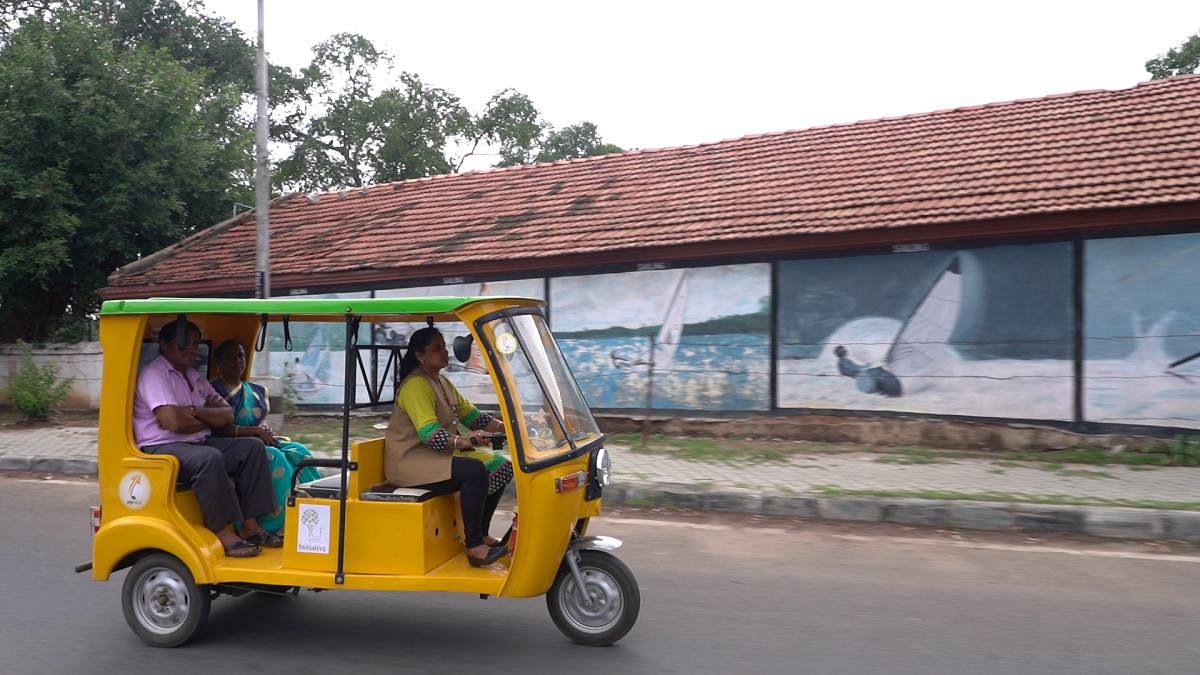
A Bengaluru-based organisation is training women to drive electric autos, and hopes to see them provide last-mile connectivity from the city’s 42 Metro station.
Yuva Chintana Foundation (YCF), with its office in Halasuru, is working in collaboration with the state government on a pilot project to promote women driving passenger and cargo autos.
“These are women largely working as domestic workers or women looking at being entrepreneurial,” says Anupama Gowda, who runs the foundation.
The plan is to align with the government’s smart city programmes and provide jobs for women at the same time.
“With this, we are trying to encourage women from across Karnataka to understand the importance of electric mobility and become entrepreneurs,” she says.
The foundation is set to train about 250 women in BBMP limits and an additional 300 women from across Karnataka. “At the moment there is community outreach to identify the women, train them and get them their licences,” she says.
The pilot began in August with eight women drivers. “We are now operating in Dasarahalli, Whitefield and Yelachenahalli. We are looking for more drivers in the Whitefield area,” says Anupama.
The BBMP has announced Sarathi, a scheme to help experienced women drivers buy and drive 500 pink autos. The foundation is in conversation with the BBMP to see how women who are already undergoing training can benefit from Sarathi.
The foundation expects all 250 women trained in the first phase to be on the job by the end of 2020.
In an interview with Metrolife, Anupama Gowda explains the project and where it is headed.
What about charging points?
We are looking at swappable batteries. Apart from this, there are already a few e-vehicle pilot charging stations in Halasuru and Indiranagar. A one-time charge gives a run of about 70 km. The project will begin with the charging done at home.
How are you going to address the safety concerns of women drivers?
At the moment we are doing pilot runs and our drivers are operating only till 7 pm. These runs allow women to assess situations and suggest realistic working hours. There is a constant analysis of safety measures. We are also looking forward to BBMP’s plan to set up cameras in pink autos. Going forward, we are looking to collaborate with online auto aggregators like Ola and Uber.
Any plans on giving self-defence training to women drivers?
Skill development is part of the 45-day training we give them, which includes emotional, physical and communication skills. We also orient our drivers with technical know-how of an e-auto. This, we believe, empowers them to address any problem related to the vehicle rather than asking for help from strangers.
Do you expect discrimination from their male counterparts?
That is the attitude shift we are trying to bring in. It is a patriarchal society that we live in, let’s acknowledge that. I think it’s about women becoming more confident and caring less about what is said. I think our greatest success will be when our women drivers don’t bother about what is said.
Will they drive at night too?
Not until they are fully prepared and become more confident. They should be the ones to make an informed choice.
How are you convincing women to pursue this profession?
We have community managers — the first four women who worked with us, and they are our ambassadors. They are also currently working as field community managers. They are
looked upon as role models by most young women.
How and where
The plan allows two ways for women to take up electric auto driving.
Metro stations: The first category covers 0-5 km from Metro stations in BBMP limits. The e-autos provide last-mile connectivity to the Metro stations. Drivers commit to a minimum of 30 rides a day. These rides don’t exceed more than 5 km at a time. With 42 Metro stations, the potential is huge.
Eight hours: The second category is for women drivers willing to give a minimum of eight hours to the job. They ply in the logistics sector, driving cargo autos to move goods from the city to the periphery.
Pilot runs
The autos are now plying in Dasarahalli, Whitefield and Yelachenahalli.
The scheme plans to cover 42 Metro stations soon, providing 0-5 km connectivity.
Prices of e-autos
Under the project, two variants are used—the e-autos that run a max speed of 35 kmph and cost about Rs 2.9 lakh on road.
The other variant, that goes beyond BBMP limits, is the e-rickshaw (already operational in Gurugram and Pune). It runs at a speed of 25 kmph and costs Rs 1.70 lakh on road.
The Yuva Chintana Foundation will be helping women get loans through various nationalised banks. Call 99450 02529 for details.